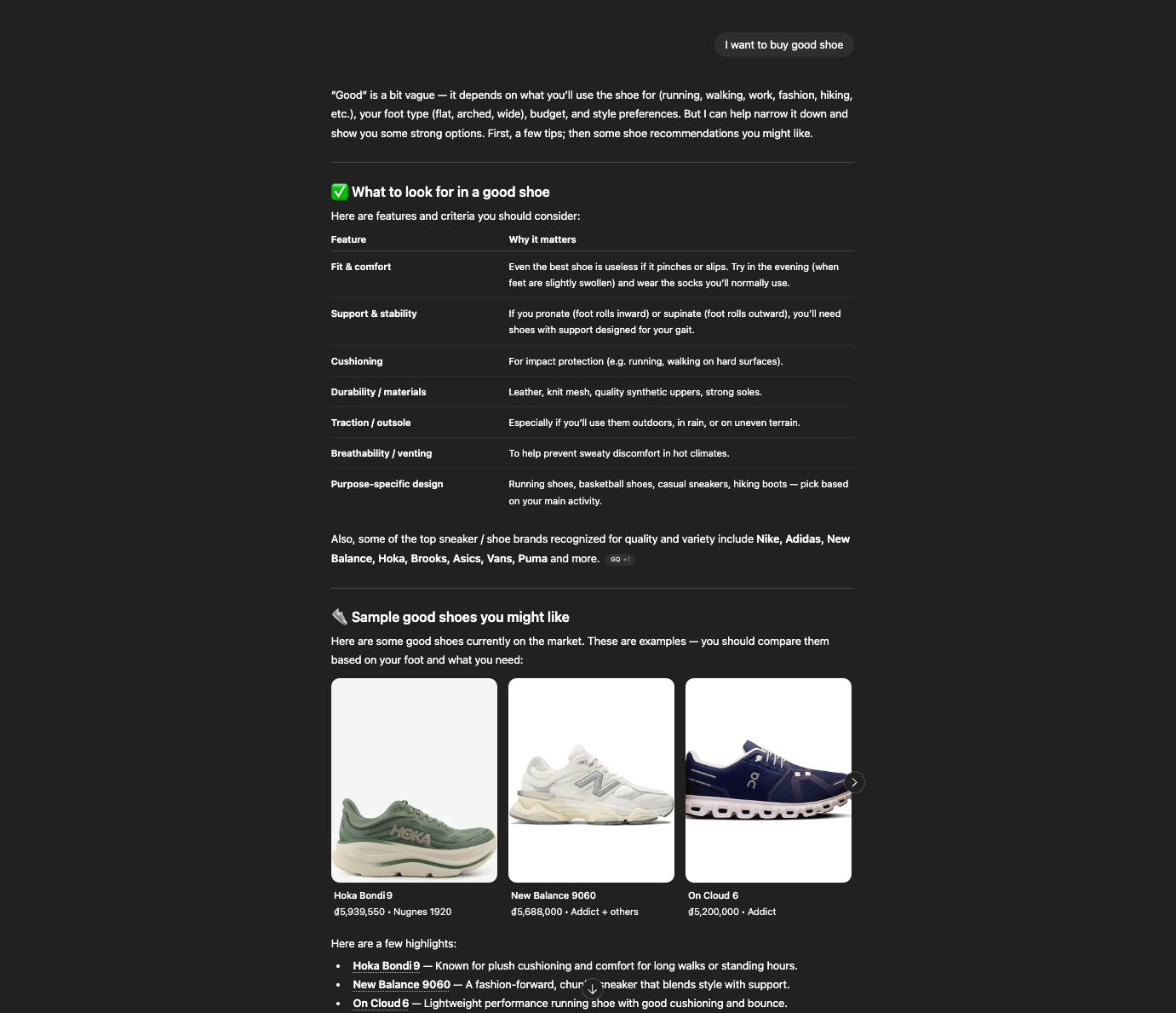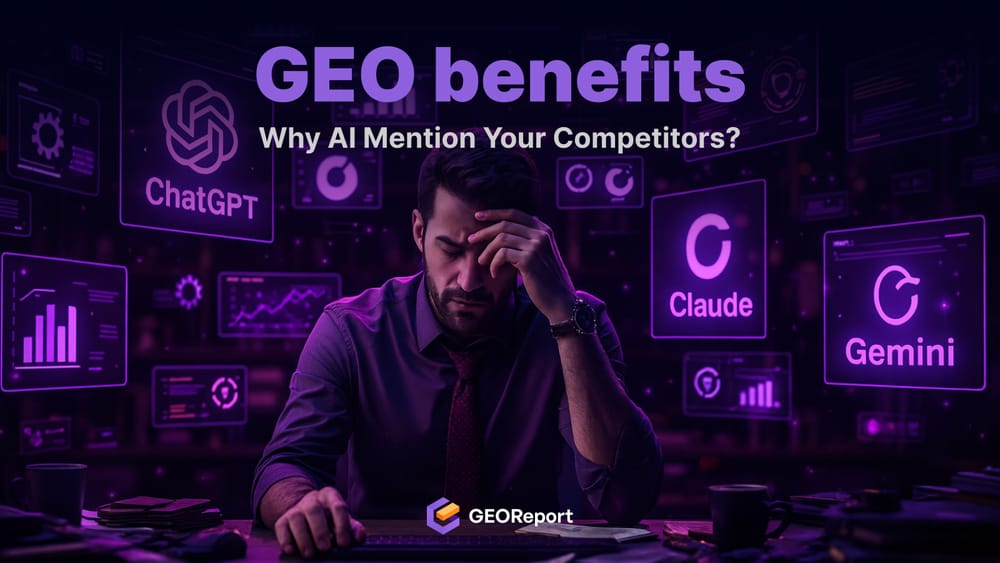BLUF:
AI mentions your competitors first not because they’re bigger, but because their content is built for AI to see by apply Generative Engine Optimization (GEO) methods. Even major brands lose visibility when their content lacks clear credibility and structure. GEO fixes that by making your brand recognizable, trustworthy, and easy for generative engines to cite.
Case Study: From Short Keywords to Long Conversations: How AI Changed the Search Game
In the traditional SEO era, users relied on Google as both a search engine and a recommendation system. If you wanted to buy a pair of shoes, you typed something short and precise like “shoe” or “best running shoes”. Back then, the ranking system rewarded keywords and backlinks, whoever optimized their metadata and link profile better, won.
But with the rise of AI-driven search and generative engines, the game has fundamentally changed. They don’t type queries; they ask questions. Instead of “shoe,” a user might say:
- “I want to buy a good pair of shoes in America that’s comfortable for daily use.”
- “What are the best running shoes recommended by athletes under $150?”
These long-tail, intent-rich queries break traditional SEO. Generative AI interprets meaning, context, and authority—not just keywords. The paradox: brands dominating traditional Google rankings, like Adidas or Nike, often vanish from AI answers.

Through GEOReport’s observation, we’ve found that high SEO rankings don’t guarantee AI visibility. Generative engines don’t automatically pull from top-ranking pages; they prioritize clarity of structured data, brand trust signals, and contextual relevance.
That leaves space for smaller, GEO-savvy competitors to appear instead in generative answers, capturing awareness that once belonged to the giants.
Insight: In the AI search era, visibility isn’t inherited only from SEO anymore, it’s earned through GEO. Even the biggest brands can disappear if their content isn’t readable or recommendable to AI systems.
That’s where Generative Engine Optimization (GEO) comes in. GEO ensures your content isn’t just indexed, it’s understood by AI. Because when users ask real, conversational questions, AI will only recommend the brands it trusts and can interpret clearly.
Why Are Competitors Getting Mentioned, but You’re Not?
Most marketers assume visibility is about content volume. In AI search, it’s about clarity and credibility.
Generative engines like ChatGPT, Gemini, and Claude evaluate which brands to cite using E-E-A-T signals (Experience, Expertise, Authoritativeness, Trustworthiness) and entity confidence, how certain an LLM is about who you are and what you represent.
If your competitor’s data is more structured, consistent, and reinforced across multiple platforms, AI will see them as the “safe choice.” You might have great insights, but if AI can’t connect your brand to authority, you’re invisible.
Insight: In GEO, being trusted beats being found.
Search engines rank pages; generative engines recommend voices.
What’s the Real Visibility Gap in AI Mentions?
AI doesn’t “search” the web, it summarizes from structured memory.
So when you ask a model a question, it recalls content from entities it already trusts.
That means your brand might:
- Rank high on Google but be absent from ChatGPT’s context window.
- Publish strong blogs, but without schema or FAQs, your content is unreadable to AI crawlers.
- Be quoted in media, but inconsistent metadata causes entity fragmentation, AI can’t tie all signals back to you.
The result: Your competitor’s name appears in generative answers, not because they’re better, but because AI knows who they are.
What Mistakes Keep Brands Invisible in GEO?
- Chasing SEO metrics only: Rankings ≠ citations.
- Ignoring structure: No schema = no semantic recognition.
- Underestimating reputation: E-E-A-T is how AI decides who to trust.
- No cross-platform consistency: Disconnected bios, outdated logos, or conflicting info weaken entity confidence.
- Not tracking AI mentions: What you don’t measure, you can’t optimize.
Without GEO, your brand isn’t competing for visibility, it’s just hoping for luck.
How GEO Helps You Reclaim AI Visibility
Generative Engine Optimization is the missing layer between SEO and AI authority. It ensures your brand is technically, semantically, and reputationally optimized for generative search.
Here’s how to fix the gap:
- Run a GEO audit: Identify where AI sees (or misses) your brand across models.
- Strengthen E-E-A-T: Add expert bios, factual sourcing, and real experience narratives.
- Add schema markup: Use
Organization,FAQPage, andArticleschemas to feed LLMs structured signals. - Unify your presence: Sync data across LinkedIn, YouTube, docs, and directories.
- Monitor citations: Track mentions from ChatGPT, Gemini, Claude, and Perplexity monthly.
How GEOReport Helps Your Brand
Understanding GEO is one thing; implementing it is another. That’s where GEOReport comes in—turning AI visibility into measurable, actionable insights.

- Brand Mention Tracking: See exactly where your brand is cited (or ignored) across ChatGPT, Gemini, Claude, and Perplexity.
- Entity Confidence Scoring: Measure how strongly AI systems recognize your brand identity versus competitors.
- Structured Data Audits: Detect missing schema, broken markup, or gaps that make your content unreadable to AI crawlers.
- E-E-A-T Analysis: Evaluate your credibility signals — expert bios, factual sourcing, and reputational consistency.
- Competitor Benchmarking: Discover why rivals get cited first and what changes would help you close the gap.
With GEOReport.ai, you’re not guessing. You’re managing AI visibility with the same rigor marketers once used for SEO rankings.
Insight: GEOReport doesn’t just show you where you stand; it gives you the roadmap to become a brand AI can confidently recommend.
What Future Trends Will Shape AI Mentions and GEO?
- AI-first indexing: LLMs will build independent brand knowledge graphs.
- Personalized trust layers: Models will adapt to user behavior and reputation.
- Citation-based ranking: Mentions in AI answers will become as valuable as backlinks once were.
- Ethical optimization: Transparency, bias control, and factual accuracy will define brand trustworthiness.
Brands investing in GEO today are training the models of tomorrow, building the reputational footprint others will spend years trying to catch up to.
FAQs
What’s the difference between GEO and SEO?
SEO helps you rank; GEO helps AI recognize, cite, and trust you.
Why do AI citations matter?
They prove your brand is part of generative answers, the new discovery layer for users.
Can small teams do GEO effectively?
Yes. Start with structured data, FAQs, and consistent branding. GEO rewards clarity, not scale.
Which models matter most right now?
ChatGPT (GPT-4/5), Gemini, Claude, and Perplexity dominate 2025’s AI visibility share.
How can I start tracking AI mentions?
Use GEOReport’s analytics to see where your brand appears across models and measure your AI visibility growth.


